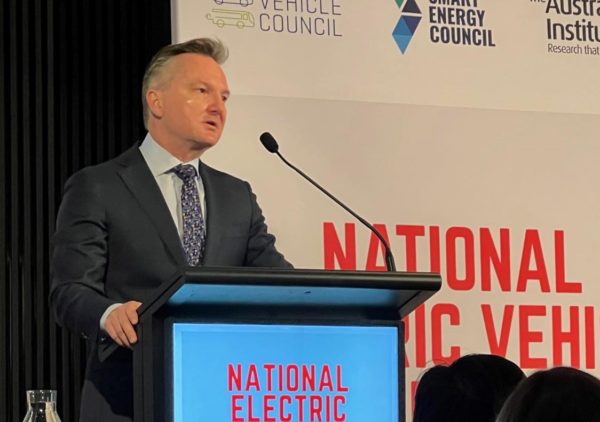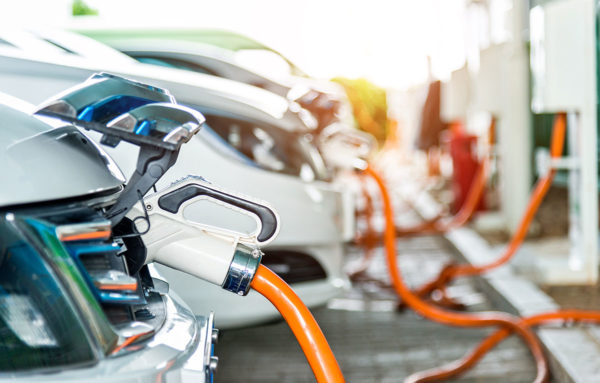Minister for Climate Change and Energy Chris Bowen announced on Friday the federal government plans to target fuel emissions standards to accelerate the uptake of electric vehicles (EVs), which account for just 2% of new cars sales in Australia, a rate nearly five times lower than the global average.
Speaking at the inaugural national electric vehicle summit in Canberra on Friday, Bowen said growing Australia’s EV market and improving fuel efficiency standards will be the focus of a National Electric Vehicle Strategy to be developed in conjunction with state and territory leaders.
“We believe that now is the time to have an orderly and sensible discussion about whether vehicle fuel efficiency standards could help improve the supply of electric vehicles into the Australian market,” he said.
“To me, this is ultimately about choice. And policy settings are denying Australians real choice of good, affordable, no-emissions cars.”
Bowen said at last count, consumers in the United Kingdom could take their pick of 26 low-emissions vehicles under $60,000. In Australia that number is only eight.
“This lack of availability has led, unsurprisingly, to a lack of sales,” he said. “Just 2% of cars sold here are electric and plug-in hybrid, compared to 15% in the United Kingdom, and 17% in Europe as a whole.”

Image: Supplied
Bowen said a discussion paper on the National Electric Vehicle Strategy will be released for consultation in September, seeking feedback from industry, unions and consumer bodies.
At the heart of the strategy will be a plan to accelerate the uptake of EVs and improve affordability and choice by implementing fuel efficiency standards for manufacturers to observe.
“Apart from Russia, Australia is the only OECD country to not have, or be in the process of developing, fuel efficiency standards,” Bowen said.
“We know from overseas experience, that with the right policy settings, EV penetration can increase quickly. Sweden, for example, increased its proportion of EV sales from 18% to 62% in two years.
“I want to see uptake of electric vehicles and hydrogen vehicles at as fast a rate as possible, as is practical. And I think having a discussion about fuel efficiency standards will help that along.”
The consultation paper will also include discussion around the establishment of a national EV charging network with charging stations at an average interval of 150 kilometres on major roads, and plans for a national hydrogen highways refuelling network.

Image: AAA
The government will also look to set a low-emissions vehicle target for the commonwealth fleet of 75% of new leases and purchases by 2025 in a bid to encourage more EV model introductions to Australia, and to expand a resale market.
Australia’s peak motoring body, the Australian Automobile Association (AAA), said it supported the introduction of a market-based mechanism to incentivise global car companies to prioritise Australia.
AAA managing director Michael Bradley said the government is right to be exploring how a light vehicle fuel efficiency standard can incentivise the supply of cleaner cars to our market but added a word of caution.
“Such an approach will boost supply of cleaner cars to our market more effectively, and at a lower cost to consumers, than the subsidies and other government assistance schemes sometimes called for,” he said. “However we need to be mindful of the factors which will continue to constrain Australia’s access to emerging technologies, such as our unique fuel quality, traditional vehicle preferences, and the fact we’re a relatively small right-hand-drive market.”
This content is protected by copyright and may not be reused. If you want to cooperate with us and would like to reuse some of our content, please contact: editors@pv-magazine.com.









10 comments
By submitting this form you agree to pv magazine using your data for the purposes of publishing your comment.
Your personal data will only be disclosed or otherwise transmitted to third parties for the purposes of spam filtering or if this is necessary for technical maintenance of the website. Any other transfer to third parties will not take place unless this is justified on the basis of applicable data protection regulations or if pv magazine is legally obliged to do so.
You may revoke this consent at any time with effect for the future, in which case your personal data will be deleted immediately. Otherwise, your data will be deleted if pv magazine has processed your request or the purpose of data storage is fulfilled.
Further information on data privacy can be found in our Data Protection Policy.